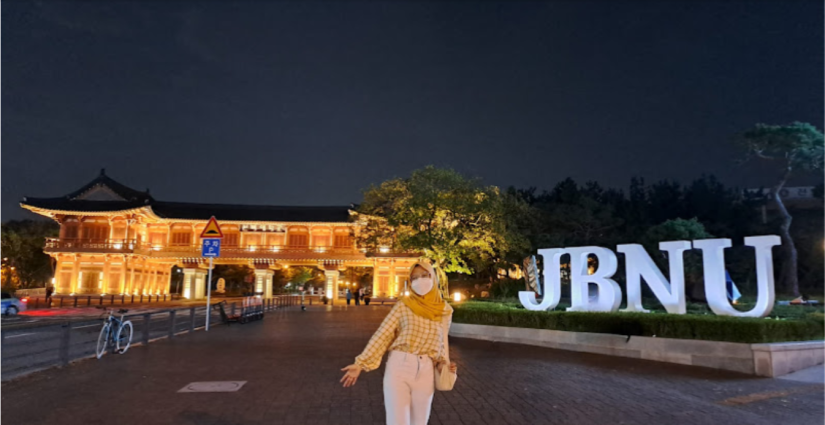
Caca did her exchange program at Jeonbuk National University (JBNU) in Jeonju, South Korea. She took five courses that were all taught in English: International Ethics and Social Justice, Introduction to Cultural Anthropology, Practical English, Social, Economic, and Environmental Sustainability, as well as Understanding British and American Culture. None of the courses are directly related to her major, which is Psychology, because all courses offered by the Psychology Department are conducted in Korean. It was challenging since the classes are very different from one another. There were big classes with students from very different backgrounds, and there was also a small class with students from very similar backgrounds where all of them even have the same religion. But still, many of them were raised in different cultures, so sometimes she heard brave and controversial opinions which shocked her. Aside from the learning environment, as a whole experience, she really wanted to go back home. It was super difficult to manage everything on her own and she got very homesick during her first week there. She was sick in quarantine so she just video-called her family and cried all day.
All classes always include active oral discussions, usually to discuss opinions on a certain theory, culture, or just to share experiences. They also had to write discussions on a problem or case study every week for International Ethics and Social Justice class. For Practical English, they had individual presentations on different units in the work book. Introduction to Cultural Anthropology also required them to do a presentation, but it was done in groups. Meanwhile Understanding British and American Culture was conducted in a different way, they had to watch different movies every week and write reviews on them to post in their blog. Some of the classes required them to read journals and textbooks, some others didn’t.
As she mentioned before, the most different thing is that the classes in the exchange university had students from various cultural backgrounds. At UGM, the classmates took the same mandatory classes, but at JBNU, they had students from various majors and countries in different classes. But still, she really enjoys having discussions with them during class because she feels like the experiences and opinions that they share vary more than in UGM. She thinks what challenged her the most academically were the classes that she took, because none of them were related to psychology majors. She even dropped one of them (she originally took 6 classes) because it was too difficult for her and she didn’t feel like she could learn anything useful in that class because it was too crowded, which distracted her from focusing on the class, and it turned out to be far too unrelated to psychology. Non-academically, the difficulties were more on how to live by herself in a foreign country. It was her first time living alone and being far away from family, so it was tough at first. Especially because she got infected with Covid-19 right after she arrived there, so she had to be alone in quarantine while her friends already made other friends out there. It took some time for her to adjust to new surroundings, new friends, and having to study, but it all worked out in the end.
She believes that the life experiences she gained during the exchange program taught her more than the classes. Back in Indonesia, her family is always willing to help her to do her daily things, which is great but limits her ability to be independent. However, in Korea, she learned to do everything on her own. She had to manage her time, money, and studies while also getting around and traveling on her own. Without those experiences, she believes it would have taken her much longer to understand adult responsibilities.
All the professors are extremely nice and she will never forget them although she might not be able to meet them again, but there are a few who stand out above the rest. One of them is the professor who is teaching International Ethics and Social Justice. Though some students had surprising and controversial opinions, he always tried to be nice about it and never judged them. She recalled a student in his class who expressed derogatory opinions about gender injustice, and both she and the professor just stared at each other, speechless, but he handled the situation calmly, as a professor should. Somehow she still remembers that student’s opinions because of how ridiculous they are.
The impression from the first meeting compared to the end of the program changed her drastically. She mentioned being shocked when listening to diverse opinions in class, but as time goes by, she learns to understand other points of view while still holding on to her own opinions. And it turns out that she doesn’t wanna go home yet. She felt like she was living her dream life there, she was so free and she got to hang out with both her new and old friends too. It was kind of hard to leave the lifestyle that had been developed there. Overall, her impression changed for the better.
Aside from the new knowledge you gain from the classes, studying abroad helps an individual to be more mature. When she first moved to Korea, she realized she couldn’t do anything on her own. She is much more independent now, and she is also developing many social skills. She believes everyone will also be able to balance their studying and partying needs, especially if you choose this program. JBNU and Jeonju are ideal for international students who prefer to live in a less dense and crowded environment. Around campus, there are study cafes where you can focus on your studies during the day, as well as karaoke and pubs where you can hang out with your friends at night! Work-life balance matters, and Korea is a great place to spend your youth!

